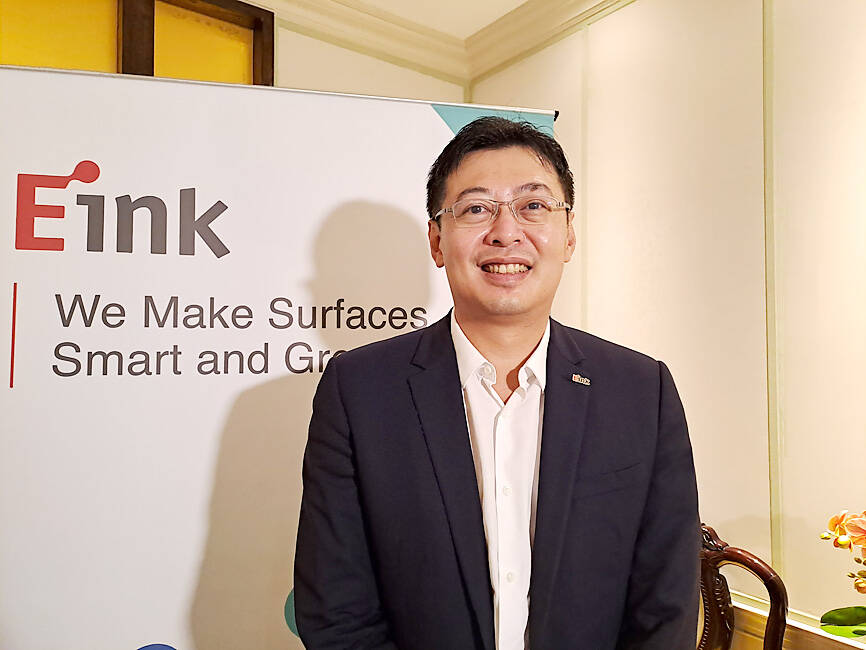E Ink Holdings Inc (元太科技), the world’s sole e-paper display supplier, yesterday said it expects revenue to grow by as much as a low double-digit percentage this year, citing robust demand for electronic shelf labels (ESLs) from retailers, but sluggish consumer demand for e-readers and e-notes that might diminish the company’s overall growth strength.
The Hsinchu-based company said it is bullish about the adoption of ESLs in the US and Europe as staff shortages and frequent price adjustments amid high inflation entice retailers to shift away from traditional shelf labels.
“We are optimistic about the ESL business. We are seeing a strong intention to install electronic shelf labels,” E Ink chairman Johnson Lee (李政昊) told a media event in Taipei yesterday.

Photo: CNA
Customers increasingly explore the usage of ESLs for signage in public spaces and for advertising on public transportation, Lee said, attributing the trend to e-paper displays becoming bigger and better at displaying colors.
E-paper displays used in ESLs have since the third quarter of last year been the firm’s biggest source of revenue.
However, the firm said it is concerned that further interest rate hikes by central banks could dent the growth of the world economy and dampen demand for e-readers.
E Ink expects revenue from e-readers to decline this year.
Some customers indicated that they might reschedule product launches and roll out new products when the world economy is in better shape, Lee said.
“Overall, we are cautiously optimistic about this year’s outlook. We still look at growth this year compared with last year, but the growth will not be as significant as what we did last year,” Lee said.
From a conservative point of view, revenue is expected to grow by a single-digit percentage this year, Lee said, adding that double-digit percentage growth is possible, depending on the macroeconomic situation, he said.
Last year, E Ink’s revenue expanded 26 percent year-over-year to NT$30.06 billion (US$975.7 million), the best performance in 11 years.
The company said its capacity expansion plans are on schedule, unaffected by macroeconomic developments.
To fuel future growth momentum, E Ink said it would this quarter or next build the fourth of six planned production lines in Taoyuan’s Guanyin District (觀音).
E Ink said it is planning to spend NT$5 billion to NT$6 billion on new facilities and manufacturing equipment this year.
E Ink’s net profits surged to a historical high of NT$9.91 billion last year, up from NT$1.84 billion in 2021. Earnings per share rose to NT$8.69 last year from NT$1.61 in 2021.
The firm’s board of directors has approved a cash dividend of NT$4.5 per common share, representing a 52 percent payout ratio. Last year, the company paid a cash dividend of NT$3.2 per common share.

SEEKING CLARITY: Washington should not adopt measures that create uncertainties for ‘existing semiconductor investments,’ TSMC said referring to its US$165 billion in the US Taiwan Semiconductor Manufacturing Co (TSMC, 台積電) told the US that any future tariffs on Taiwanese semiconductors could reduce demand for chips and derail its pledge to increase its investment in Arizona. “New import restrictions could jeopardize current US leadership in the competitive technology industry and create uncertainties for many committed semiconductor capital projects in the US, including TSMC Arizona’s significant investment plan in Phoenix,” the chipmaker wrote in a letter to the US Department of Commerce. TSMC issued the warning in response to a solicitation for comments by the department on a possible tariff on semiconductor imports by US President Donald Trump’s

The government has launched a three-pronged strategy to attract local and international talent, aiming to position Taiwan as a new global hub following Nvidia Corp’s announcement that it has chosen Taipei as the site of its Taiwan headquarters. Nvidia cofounder and CEO Jensen Huang (黃仁勳) on Monday last week announced during his keynote speech at the Computex trade show in Taipei that the Nvidia Constellation, the company’s planned Taiwan headquarters, would be located in the Beitou-Shilin Technology Park (北投士林科技園區) in Taipei. Huang’s decision to establish a base in Taiwan is “primarily due to Taiwan’s talent pool and its strength in the semiconductor

An earnings report from semiconductor giant and artificial intelligence (AI) bellwether Nvidia Corp takes center stage for Wall Street this week, as stocks hit a speed bump of worries over US federal deficits driving up Treasury yields. US equities pulled back last week after a torrid rally, as investors turned their attention to tax and spending legislation poised to swell the US government’s US$36 trillion in debt. Long-dated US Treasury yields rose amid the fiscal worries, with the 30-year yield topping 5 percent and hitting its highest level since late 2023. Stocks were dealt another blow on Friday when US President Donald

UNCERTAINTY: Investors remain worried that trade negotiations with Washington could go poorly, given Trump’s inconsistency on tariffs in his second term, experts said The consumer confidence index this month fell for a ninth consecutive month to its lowest level in 13 months, as global trade uncertainties and tariff risks cloud Taiwan’s economic outlook, a survey released yesterday by National Central University found. The biggest decline came from the timing for stock investments, which plunged 11.82 points to 26.82, underscoring bleak investor confidence, it said. “Although the TAIEX reclaimed the 21,000-point mark after the US and China agreed to bury the hatchet for 90 days, investors remain worried that the situation would turn sour later,” said Dachrahn Wu (吳大任), director of the university’s Research Center for